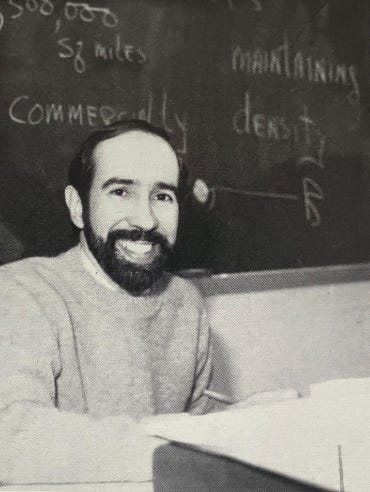Anyone who ever had Rui Santos as a history teacher while attending high school in the small southeastern town of East Bridgewater, Massachusetts, likely speaks a common language.
If your current events quiz involved any mention of Boston Celtics star Kevin McHale decades back, a typical Santos response would be, “The last thing I knew about McHale was that he owned a navy!” If political leader Yasser Arafat came up, it was immediately countered with Santos yelling, “Yasser, no sir” repeatedly as if he were cleverly entertaining himself with his own creative wordplay. If you sneezed in his class, Santos would often shout the medieval retort, “Sneezing is a sign of sin!” He humorously chided students for not knowing what NATO was implying that, to high school kids, NATO probably means, “No action, talk only!” If he mentioned President Reagan’s Secretary of State, George Shultz, Santos would ask, “You know that sergeant from Hogan’s Heroes?” After getting everyone in the class to nod affirmatively thinking that there might actually be some possible connection, Santos would scream, “No relation!” On occasion, Santos would stand behind his desk holding up a copy of the Boston Globe making sure that every student in the class could see the newspaper and then slam it down exclaiming, “Good! It’s tax deductible!” He encouraged us to get out of our small town of East Bridgewater when ready for college. He warned us that attending Bridgewater State in the next town over was not far enough away, saying that if you had the ability to return home and have your mother do your laundry then you were not really away at college. Santos shared his own experience of being a less than stellar student in high school who narrowly passed, and would often explain how he was forced to attend Cape Cod Community College to prove that he could earn the grades that he should have had in high school. After learning the hard way how to actually be a student, Santos received an opportunity to move on to Marshall University in West Virginia. Santos told stories about what it was like to go to Marshall, about how he was forced to take a required swimming class during his initial semester at the school, having to overcome both his fear and reluctance to take that swimming class in order to get through. He frequently mentioned a former college professor, Black Jack Mulligan, someone that Santos held up as a role model with stories that gave our high school class an introduction to a college professor who was both demanding and intimidating. Santos told us that we would be lucky to rent a college apartment like the cheap place he once lived in that was overrun with cockroaches. He described having to sleep with the lights on so that the bugs did not crawl into his ears in the middle of the night. Marshall University was also where Santos learned to be a serious student, a real student, which he described as someone who spends the majority of their time pouring over books in the college library, a necessary strategy he told us we would have to develop as a forced habit. He told us that kids who went off to college expecting to have fun were usually sent home by Christmas, adding that colleges would be more than happy to keep your money and replace you with another incoming student who was willing to pay them another round of tuition.
Santos was notorious for warning kids who claimed to have their futures all figured out. Many of his classroom rants were communicated dramatically to show how the current behaviors of certain students were not transferable to what he called the real world. To Santos, these were the kids that considered themselves too cool to hear his message, the ones who spent their time, as he would say, “Smoking down on the wall with Willie!” referring to the stone wall that lined the streets of our town center and gained a reputation as a gathering spot for long-haired teenagers during the 1970s. He constantly warned us that we would end up “pumping gas at Hoppy’s” and he would sarcastically mimic those that already had idealistic plans to marry their high school sweethearts immediately after graduating, to be in love, and then get a puppy. Santos would then change his tone and sternly warn that when you suddenly have a baby and the infant develops a temperature, you’ll need to take the baby to a doctor, and because pumping gas at Hoppy’s doesn’t give you a health plan, the doctor’s appointment is going to cost you thousands of dollars meaning that you’ll be wishing you had worked harder back in high school when you had the chance.
As an academic teacher, Rui Santos was unmatched. Now with degrees from Northeastern University and Boston College, Santos still remains the toughest academic teacher I have ever had. I knew exactly how to approach every difficult college class I would later find myself in because of what I had experienced in Rui Santos’ history class. Santos carried himself like a college professor who had been forced to settle for a high school job teaching history. Every test Santos gave was in essay format and every response had to be written in a blue composition book. Classes were sometimes given three potential essays to prepare for in advance of which you would only be required to answer two on the test, but Santos would never reveal which two he was going to assign until the actual day of the exam. It was, therefore, to your advantage to work hard and prepare for all of them. He scored tests and quizzes using a total point system which, at the time, was much more of a college model. Santos made all of his students better writers because you were typically only listening, thinking, and writing while in his class. It became a ritual for me to use an old IBM typewriter that we had at our house to summarize history books from Santos’ class, many of the books being more reminiscent of something that would be considered college level such as supplemental paperbacks he would assign about Victorian England or Modern Russia. I was, admittedly, not a very good student at that point but it was essential, just as it probably had been essential for Santos when he found himself forced to attend Cape Cod Community College, to be able to keep up with the work if only to keep my head above water.
Rui Santos encouraged students academically and culturally while stressing the importance of American citizenship. “I still remember his rants to this day,” says former student, Michelle Ringuette, from her current home in Washington D.C.. “He was the hardest teacher, but his realpolitik about the world was unsurpassed.” Santos once told our Modern European History class to commit to memory, as a side assignment, an extensive list of authors and the literature that they were responsible for writing, two to three books for most of the writers. We were told by Santos that this was information that we should be culturally aware of and, to this day, it is the first thing I think of when I hear any mention of Babbitt by Sinclair Lewis or Anna Karenina by Tolstoy. He once showed us the 1964 Michael Caine film, “Zulu”, to accompany our topic of study. At the end of the film, Santos asked us if we would watch that movie at home on television. When the class basically shrugged off the question, Santos said, “Good! That’s exactly why I showed it,” implying that part of his job was to introduce us to facets of culture that we would probably never pay attention to outside of his classroom. Santos once showed us a 16mm film about agriculture as part of our geography class so that we could see a visual example of the American midwest and the importance of the values represented through the American farm.
I very much doubt that there are teachers that could exist in the classroom today with a similar character and style as Rui Santos, a big loss for the current generation. The messages that Santos communicated were precisely what we needed to hear when we were teenagers decades ago in East Bridgewater, and although there have been dramatic changes in public education over the years with more of a leaning towards social-emotional needs rather than the importance of routine, structure, discipline, and respect, kids really haven’t changed much in terms of what they truly need to hear in the classroom.
Rui Santos was tough, but tough was good for kids both in terms of academic achievement and learning how to be respectful, responsible adults. As a teacher known for having stratospheric expectations, Santos demanded your attention. You were engaged in his class, although you were almost never asked to participate in it, only to have your eyes and ears open. Santos was the prime focus, and you listened to every word he said whether you interpreted those words as useful content, good advice, comic performance, or the diatribe of a raving lunatic. Your job was to listen and learn, and if you were able to successfully interpret the messages coming at you from the loud, fiery, spirited presentation of Rui Santos, you knew that his intention was to lead you toward a successful academic path and the life that was still in front of you.
Mr. Santos was exactly the teacher we needed.
If you like my articles, please hit the “LIKE” button. It will help to let me know that you are enjoying my writing.
I welcome and invite you to COMMENT.
And please SHARE these posts! This gives added support to my Substack page and also helps to add new readers.
Thanks so much to anyone who is reading Journeys with Jay!









So true! Don't forget his CC and Track coaching too. Great man all around! And I'll never forget his re-enactment of the assassination of Archduke Ferdinand in his WWI class.
My CC coach, And a very entertaining teacher, One of my favs. Jim Lucier Class of 78.